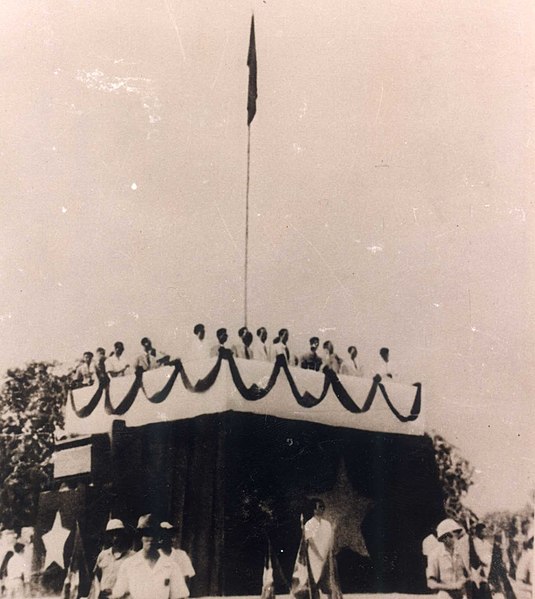Reunification Day, also known as Victory Day, Liberation Day, or by its official name, Day of the Liberation of the South and National Reunification is a public holiday in Vietnam that marks the event when the North Vietnamese and Viet Cong forces captured Saigon, the capital of South Vietnam, on 30 April 1975, thus ending the Vietnam War. The event marked the start of the transition period of reunification, which also occurred in a national election for reunification on 2 July 1976, when the South Vietnam and North Vietnam were merged, forming the modern-day Vietnam.
Banner in Hanoi for Reunification Day
Statue commemorating the "Victory of 30 April 1975" at the Museum of the Ho Chi Minh Campaign
A street in Da Nang, Vietnam. Flags are being displayed on the occasion of Reunification Day, a national holiday
A sign in Hanoi, 2009, depicting the moment a Viet Cong tank crashed into the Presidential Palace on April 30, 1975.
North Vietnam, officially the Democratic Republic of Vietnam, was a socialist state in Southeast Asia that existed from 1945 to 1976, with formal sovereignty being fully recognized in 1954. A member of the Eastern Bloc, it opposed the French-supported State of Vietnam and later the Western-allied Republic of Vietnam. North Vietnam emerged victorious over South Vietnam in 1975 and ceased to exist the following year when it unified with the south to become the current Socialist Republic of Vietnam.
The North Vietnamese government in 1946.
Ho Chi Minh declaring independence at Ba Dinh Square on September 2nd, 1945
A Viet Minh rally outside the Hanoi Opera House during the August Revolution, 1945.
Ho Chi Minh (seated, right) with Tôn Đức Thắng (seated, left) and other DRV leaders in a liberated zone of northern Vietnam during the First Indochina War.








